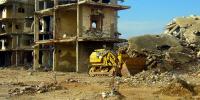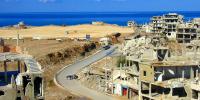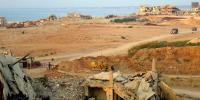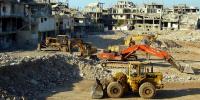After the Palestinian refugee camp Nahr al-Bared was totally destroyed in a war in 2007, the Lebanese government promised the 30.000 refugees a quick reconstruction and the return to the camp. However, the government's words haven't materialized yet, while the camp remains under the tight grip of the Lebanese army.
„Nahr al-Bared wasn't destroyed to be rebuilt. It was destroyed and that's it. I want to emigrate!“ These are the words of Marwan Hamed, a 30-years old Palestinian refugee currently living in a 18 square meters 'temporary shelter' on the outskirts of Nahr al-Bared refugee camp in northern Lebanon. After fleeing to a school in the near Beddawi refugee camp in May 2007, he has returned to Nahr al-Bared early 2008. Having lived in an iron barracks for almost two years, Hamed has lost any hope that the camp would be rebuilt, living conditions would improve and he could find work.
In May 2007, a 15-weeks battle between the non-Palestinian militant group Fatah al-Islam and the Lebanese Armed Forces (LAF) erupted in Nahr al-Bared. The fighting left 54 civilians and approximately 400 soldiers and militants dead. The refugee camp was left totally destroyed and while it was under sole control of the LAF, homes were burnt down, blown up and systematically looted.
Already during the war, former Lebanese prime minister Fouad Siniora made three promises to the refugees: “Your displacement is temporary, your return definitive and the reconstruction of Nahr al-Bared certain.” The government's willingness to rebuild Nahr al-Bared is remarkable keeping in mind the conflict-ridden past of the Palestinian refugees in Lebanon. Camps destroyed during the civil war such as Tel az-Zataar or Jisr al-Basha were never rebuilt and the rejection of permanent resettlement of Palestinian refugees remains one of the very few consensuses within Lebanon's political arena.
After the government along with the UN Relief and Works Agency for Palestine refugees (UNRWA) and the grassroots Nahr al-Bared Reconstruction Commission (NBRC) launched a master plan for the reconstruction of the camp in February 2008, a donor conference was held in Vienna in June 2008. In the document outlining its recovery and reconstruction strategy for Nahr al-Bared, the Lebanese government states the camp “will not return to the previous environmental, social and political status quo ante that facilitated its takeover by terrorists.”
Over and over, prime minister Siniora vowed Nahr al-Bared once rebuilt would come under the authority of the Lebanese state and its security forces, thereby becoming a “model camp” for the other official eleven Palestinian refugee camps on Lebanese soil. At the iron barracks, cynicism and frustration reign. Marwan Hamed angrily asks: “Nahr al-Bared is supposed to be a model? A model for what? A model for unemployment, depression and denial?”
About two thirds of the camp's inhabitants used to live in the original core of Nahr al-Bared, which was totally destroyed. After most of the rubble was removed, the foundation stone for the new camp was laid in spring 2009. Reconstruction has only started in November though, as in summer a moratorium issued by Lebanon's state council stopped all works. At a time where power struggles blocked the formation of the new government, Michel Aoun, leader of the Free Patriotic Movement abused the finding of antique ruins under Nahr al-Bared's rubble to file a plea. The process was also delayed by the wast amounts of unexploded ordnance and the expropriation of the land from its private owners.
Charlie Higgins, UNRWA's Project Manager for Nahr al-Bared's Reconstruction, is pleased by the start of the reconstruction, but warns: “We've just crossed the starting line and it's been a long time actually getting to the starting line.” At NBRC's improvised offices in Nahr al-Bared everybody remains quite realistic, too. Abu Ali Mawed, a member of NBRC says: “People are everything but optimistic regarding reconstruction. There were too many unfulfilled promises and the pace of the process is very slow.” Mawed adds he'd start to feel optimistic only when seeing the first people living in their homes.
At UNRWA's heavily-guarded compound in Tripoli, Higgins says not technical difficulties were the worst to overcome, but administrative, legal and political ones. “The reconstruction of Nahr al-Bared is not a completely accepted issue in Lebanon. There are people who, for one reason or another, object to rebuilding Nahr al-Bared,” he says and warns that he expects further difficulties in the future.
One of the problems ahead is that UNRWA has so far only been able to raise about a third of the 328 million dollars required to rebuild Nahr al-Bared. “This does neither surprise us nor should it stop us from moving ahead,” says Higgins, who's optimistic that UNRWA will raise more money once donors see the first buildings going up.
For Amr Saededine, an independent journalist following the events in Nahr al-Bared, a major problem is the Lebanese army's role: “The government permitted the army to even interfere in the planning of the reconstruction.” He feels reminded of how in the 19th century Baron Haussmann under Napoleon III planned Paris: The LAF look at Nahr al-Bared solely from a security perspective. Saededine says the LAF had unsuccessfully tried to forbid the building of balconies, but – as did Israel in Jenin camp – insisted the streets would be broad enough so tanks could enter. He blames the civilian offices on the Lebanese side for hiding behind the LAF: “All these civilians working in their specific field, reconstruction, need to get approval by the army. But it's about rebuilding a civilian area, not about something else!”
The LAF have declared Nahr al-Bared a military zone. The army has sealed-off the bulldozed core of the camp and also controls and limits access to the surrounding area, where almost 20.000 refugees have temporarily resettled. Without special permits issued by the army's secret service, entering Nahr al-Bared isn't possible. Journalists either aren't allowed in or are accompanied by soldiers – even during interviews.
Cutting off Nahr al-Bared from the surrounding Lebanese communities not only negatively affects relations between Palestinians and Lebanese, but also hampers the camp's economic recovery. Before the war, half of Nahr al-Bared's customers were Lebanese, as they profited from the camp's cheap prices and the ability of businessmen to sell on credit. Since autumn 2007, when the first refugees were allowed to return to the camp, many businesses have re-opened. This superficial impression is misleading, however.
In Jar al-'Amr, a neighborhood at the southern edge of the camp, an old woman running a grocery store complains: “In the beginning I was alone. Now, several others have opened in the same street and I sell far less.” Similar complaints can be heard all over Nahr al-Bared, as tiny grocery stores, coffee shops, bakeries and sandwich restaurants are abundant. The Palestinian-Arab Women League (PAWL) runs several programs to provide local entrepreneurs with in-kind grants. Sahar Itani, who coordinates the programs, says that the market is saturated, as the customer base is limited to those living inside the fenced-off camp.
Further down the street in Jar al-'Amr, Rima Ghannam and her husband have spent the last two years rebuilding their damaged, totally looted and partly burnt carpenter workshop. Small factories and companies like their's weren't as unusual in Nahr al-Bared as in other camps. Before the war, access to the camp was unlimited and business was prosperous. Ghannam proudly points at the new machines in the workshop and says: “We've rebuilt it the way it was. However, we need to display our work in a big gallery not in a small room and wait until a customers comes and buys it.”
Ghannam says that using lower quality raw material and selling piece by piece is difficult. She explains: “If we were able to return to producing collections of beds and furniture, the situation would certainly improve.” Being highly indebted and cut-off from their customers, she hopes the army will open the checkpoints, thereby facilitating traffic to the nearby highway connecting Tripoli to the Syrian border.
The LAF meanwhile claim their security arrangements “aim first and foremost to preserve people’s safety through preventing the infiltration of terrorists and wanted people, smuggling of weapons, explosives, and illegal material.“ In contrast, UNRWA's Charlie Higgins considers the LAF's security arrangements “a significant barrier to the recovery of the camp in every sense.” He describes the economic situation in the camp as “stuck.”
In October, the LAF dropped the requirement of permits for Lebanese citizens to enter the camp. However, the number of Lebanese customers has hardly increased, as they still face delays, searches and questioning at al-Abdi, the only checkpoint they're allowed to enter from. Several Lebanese citizens have reported using their old permits again, as their entry would be quicker.
Within Nahr al-Bared, the army and its secret service rule at will. The refugees have become very careful talking openly and in public about issues related to these institutions or the Lebanese state. The secret service has abused the refugees' difficult situation and recruited countless informants, especially women, whose services they mostly 'pay' with phone cards.
Recently, the Internal Security Forces (ISF), Lebanon's police, have set up a post at the northern edge of the camp. Their current role seems to be limited to patrolling the streets. Marwan Abdulal, leader of the theoretically left-wing Popular Front for the Liberation of Palestine (PFLP) and the Palestine Liberation Organization's (PLO) person in charge for the reconstruction of Nahr al-Bared says “the problem is that when the ISF entered, the army remained present instead of making place for the ISF.” He demands the transformation of Nahr al-Bared from a military into a civilian area and the withdrawal of the army.
Future security arrangements in Nahr al-Bared are currently heavily debated. The Lebanese government intends to keep Nahr al-Bared under the state's sovereignty and introduce the Anglo-Saxon model of community policing in the camp. The U.S. currently fund a US$ 6 million program to train the ISF. Saededine criticizes the idea as absurd: “They drop it with parachutes and make Nahr al-Bared a testing field. It's neither implemented in Lebanon nor anywhere in the region.” He argues that the Lebanese government is prioritizing the implementation of community policing to having a dialogue with the Palestinians leading to an agreement.
Meanwhile, the PLO prefers to to keep up Palestinian self-governance and reform the camp's popular committee. It proposes the formation of an internal police coordinating with the popular committee and the ISF, which would be stationed outside the camp. The PLO's Marwan Abdulal, himself a resident of Nahr al-Bared, says that introducing direct Lebanese policing in the camp wouldn't work: “If the law remains discriminatory, but should be enforced, the experiment is doomed to fail.”
Indeed, implementing current Lebanese law in Nahr al-Bared would mean the ISF had to arrest basically everyone, says Saededine: “Palestinians aren't allowed to own property, to work in many professions, to open shops etc.” Obviously, the implementation of Lebanese law in the camp would mean to engage in a serious discussion of civil rights for Palestinians in Lebanon. In no other Arab country, Palestinians have been facing as much legal discrimination as in Lebanon.
For Abdulal it is clear: “It's impossible to have Lebanese state security without human security for Palestinians. Palestinians need to be given civil rights.” In a positive step, in 2005 the Lebanese-Palestinian Dialogue Committee (LPDC) was established by the Lebanese Council of Ministers. The committee's mandate is to improve living conditions of the country's 250.000 Palestinian refugees. So far however, the LPDC's impact has been marginal and the most important issues such as giving Palestinians free access to the Lebanese labour market haven't been tackled.
Nahr al-Bared's reconstruction is a very political undertaking and all sides involved regard it as deeply connected to the future of Palestinian refugees in Lebanon and their relationship to their host country. There are opportunities and indeed, some Lebanese political actors are willing to fundamentally change the Palestinian's situation to the better. However, many obstacles remain and developments in Nahr al-Bared over the last two and a half years indicate an ongoing hegemony of security considerations regarding the treatment of Palestinians in Lebanon, which contradicts all the nice words and promises.
The original version of this report was published in the Swedish weekly newspaper Arbetaren. Ray Smith is an activist with the autonomous media collective 'a-films', which has been documenting developments in Nahr al-Bared for the past two and a half years. The group has published various reports and short films.
Previous reports on Nahr al-Bared:
Nahr al-Bared's economic recovery hampered by military siege - January 2010
New Lebanese security approach rejected by Palestinians - January 2010
Rebellious rhymes from a destroyed refugee camp - December 2009
Refugees remain sceptical of Nahr al-Bared reconstruction - November 2009
Nahr al-Bared reconstruction delays protested - October 2009
Nahr al-Bared's reconstruction in limbo - September 2009
Shattered camp revives under military eyes - August 2009
Nahr al-Bared's forgotten 'Prime Areas' - June 2009
No Work in Nahr al-Bared - May 2009
Growing Resentment in Nahr al-Bared - May 2009
Uncertainty Clouds Nahr al-Bared's Future - October 2008
More Questions than Answers - May 2008
Who Burned Nahr al-Bared? - April 2008
The 'Humanitarian' Sidelining of Nahr al-Bared - April 2008




